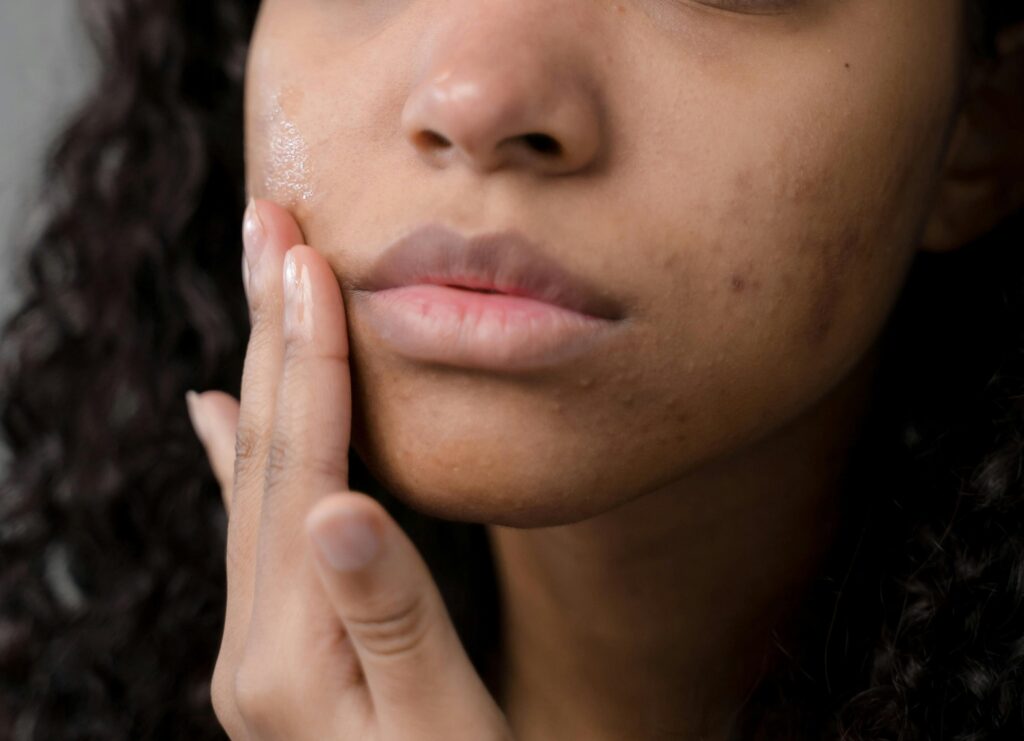Hyaluronic acid is a well-known skincare ingredient, loved for its ability to hydrate and plump the skin. Hyaluronic acid is a common choice in many skincare routines, but some people wonder if it can cause acne. If you’re unsure or have concerns, let’s explore how hyaluronic acid works with your skin and whether it might contribute to breakouts.
What Is Hyaluronic Acid?
The first step in understanding whether hyaluronic acid can cause acne is to know what it is and how it works. Hyaluronic acid is a naturally occurring substance in the body, found in the skin, joints, and connective tissues. Its main function is to retain water, keeping tissues lubricated and moist.
In skincare, hyaluronic acid is included in serums, moisturizers, and masks for its ability to attract and hold up to 1,000 times its weight in water. This helps:
- Hydrate the skin
- Reduce fine lines and wrinkles
- Promote a plump, youthful complexion
While this sounds beneficial, it raises the question: could this same hydrating property lead to clogged pores or acne?

Does Hyaluronic Acid Actually Cause Acne?
The simple answer is no, hyaluronic acid itself doesn’t cause acne. It’s non-comedogenic, meaning it doesn’t clog pores. However, there are scenarios where it could potentially contribute to breakouts indirectly:
1. Poor-Quality Products
Not all products containing hyaluronic acid are created equal. Some may include additional ingredients like fragrances, oils, or preservatives that can irritate sensitive skin or clog pores, leading to acne.
2. Layering Issues
Using hyaluronic acid incorrectly in your routine might also cause problems. For instance:
- Applying it to dirty or unexfoliated skin can trap oils and impurities.
- Skipping a moisturizer after hyaluronic acid may cause your skin to overproduce oil, leading to breakouts.
3. Reaction to Other Ingredients
Sometimes, it’s not the hyaluronic acid causing acne but how it interacts with other ingredients in your routine. For example, combining it with overly rich creams or oils can create a heavy layer on the skin, triggering clogged pores.
4. Overuse
Using too much hyaluronic acid or applying it multiple times a day can overwhelm the skin, potentially disrupting its natural barrier and leading to sensitivity or breakouts.
✨ Also read: What Does Hyaluronic Acid do for Acne? to learn how it can improve hydration without clogging pores.
How to Use Hyaluronic Acid Without Worrying About Acne
If you’re worried about whether hyaluronic acid can cause acne, here are tips to ensure it works for your skin:
1. Choose the Right Formula
Opt for products labeled “non-comedogenic” and free from added fragrances or heavy oils. Look for lightweight, water-based formulas if you have acne-prone skin.
2. Cleanse Before Application
Always apply hyaluronic acid to clean skin. This prevents it from trapping dirt or oil that could cause breakouts.
3. Seal It In
Hyaluronic acid draws moisture to the skin but needs a moisturizer to lock it in. Without sealing it, your skin may dry out and produce more oil, potentially leading to acne.
4. Patch Test First
Before introducing any new product into your routine, do a patch test to ensure it doesn’t cause irritation or an adverse reaction.

Who Should Avoid Hyaluronic Acid?
While hyaluronic acid is generally safe for all skin types, some individuals may find it unsuitable, including:
- Those with overly sensitive skin: Some may experience irritation from additional ingredients in hyaluronic acid products.
- People with compromised skin barriers: If your skin barrier is damaged, even mild products can trigger reactions.
- Those in dry climates: In extremely low-humidity environments, hyaluronic acid can draw moisture from the deeper layers of your skin instead of the air, leading to dryness.
If you suspect hyaluronic acid isn’t working well for you, consult a dermatologist to find alternative options.
✨ Also read: What is the Best Skin Care For Fungal Acne? to find effective solutions for clearer, healthier skin.
What Are the Benefits of Hyaluronic Acid for Acne-Prone Skin?
Ironically, while some worry that hyaluronic acid can cause acne, it’s often recommended for people with acne-prone skin. Here’s why:
1. Hydration Without Clogging Pores
Hyaluronic acid delivers deep hydration without adding oils, making it ideal for acne-prone skin that needs moisture but is sensitive to heavier products.
2. Reduces Redness
Its soothing properties can calm irritation and redness, often associated with breakouts.
3. Helps Skin Heal Faster
Hyaluronic acid supports the skin’s natural repair process, promoting faster healing of acne lesions.
4. Prevents Dryness
Many acne treatments, like benzoyl peroxide or salicylic acid, can dry out the skin. Hyaluronic acid helps counteract this side effect, maintaining balance in your skin.

How to Spot the Best Hyaluronic Acid Product for You
Choosing the right product is key to avoiding potential issues. Keep an eye out for:
- Concentration: Products with 1–2% hyaluronic acid are effective without being too heavy.
- Texture: Lightweight serums work better for oily or acne-prone skin.
- Reputable Brands: Trusted brands often use better formulations, reducing the risk of irritation.
Alternatives to Hyaluronic Acid for Acne-Prone Skin
If hyaluronic acid doesn’t suit your skin or you’re seeking alternatives, consider these options:
- Aloe Vera Gel: A natural hydrator that soothes inflammation and redness.
- Niacinamide: Helps reduce oil production and supports skin hydration.
- Ceramides: Strengthen the skin barrier while keeping it moisturized.
✨ Also read: What Does Hyaluronic Acid do for Hair? to discover how it can transform dry, dull hair into soft, shiny locks.
Final Thoughts
So, can hyaluronic acid cause acne? The answer lies in how you use it and the products you choose. Hyaluronic acid itself is unlikely to cause breakouts, but the wrong formulations or application methods might. When used correctly, it can be a fantastic addition to your skincare routine, especially for hydrating and soothing acne-prone skin.
If you’re still unsure, consult with a dermatologist to tailor your skincare routine to your specific needs. With the right approach, hyaluronic acid can be a helpful ally in achieving clear, hydrated skin.

